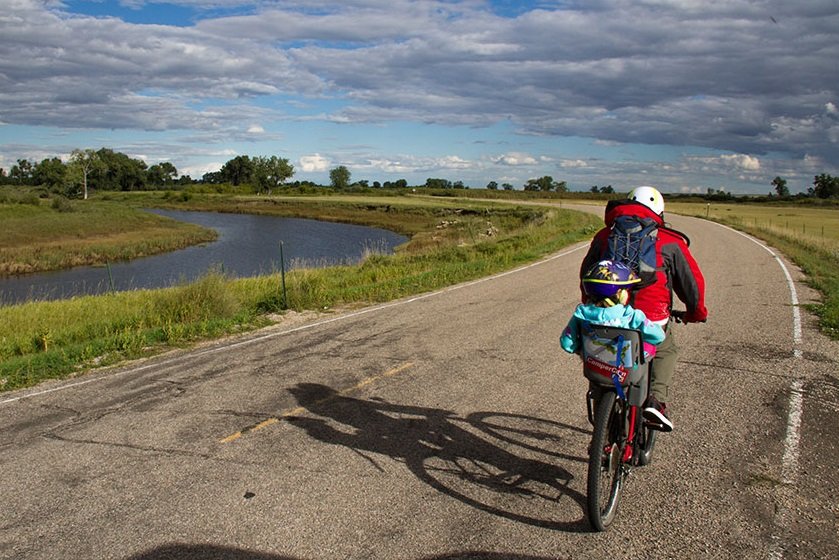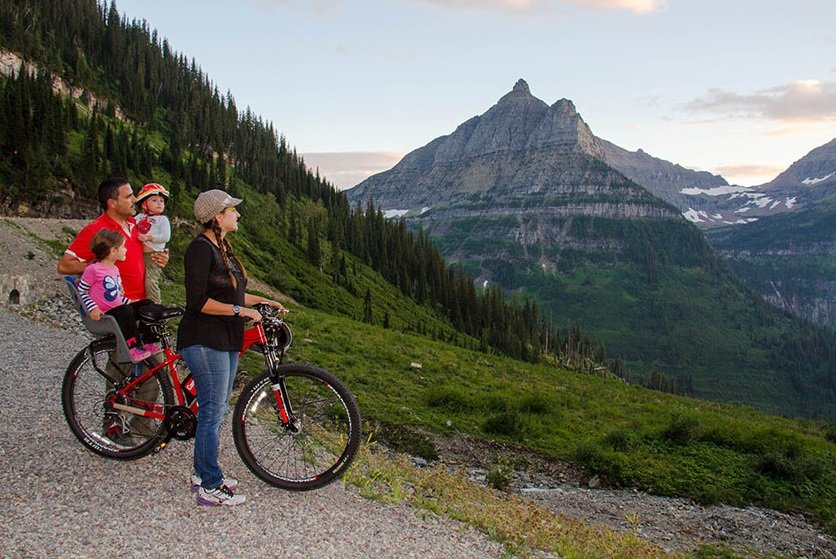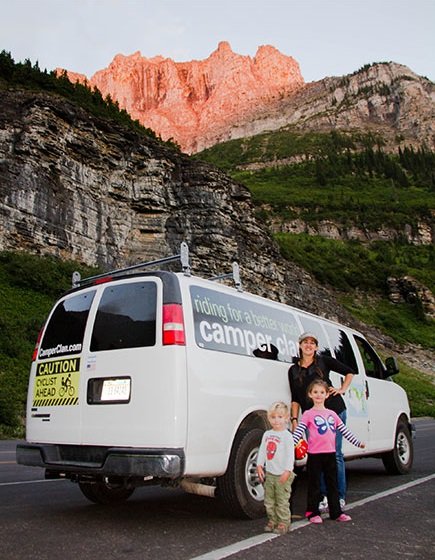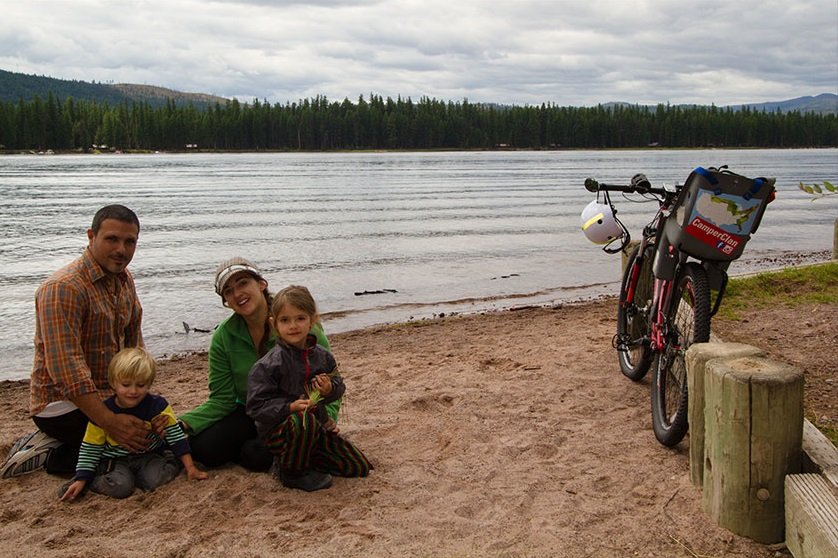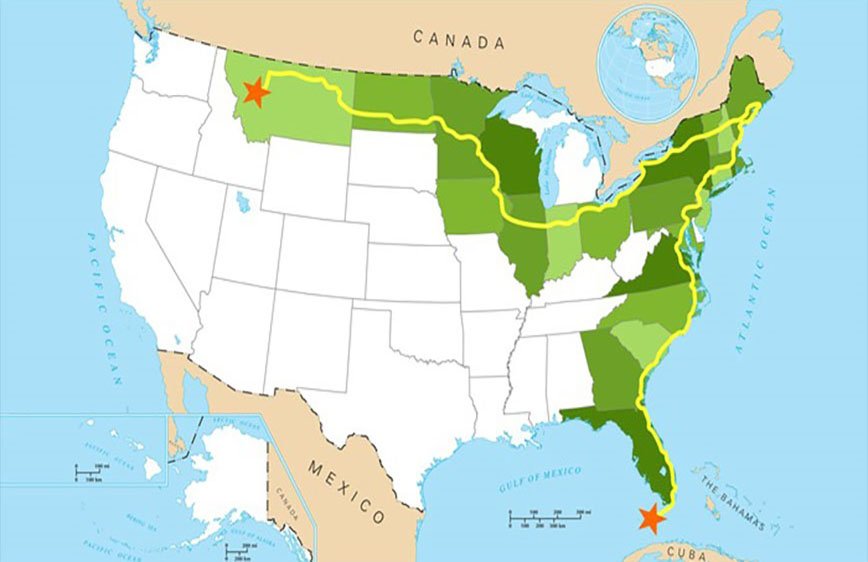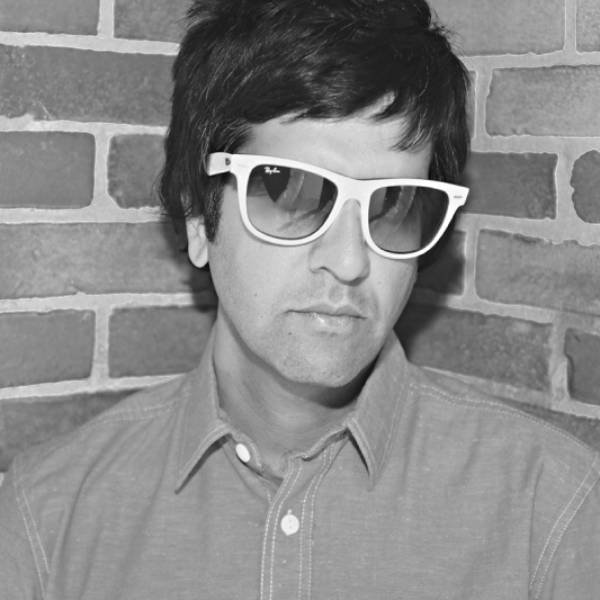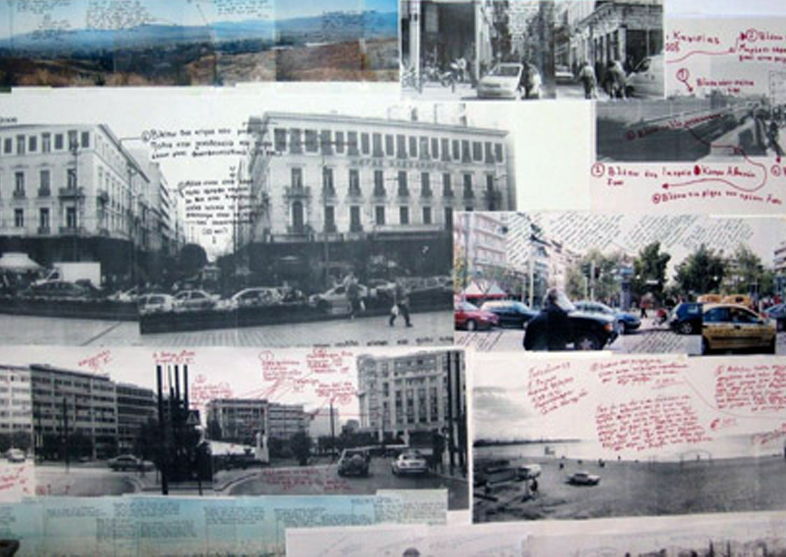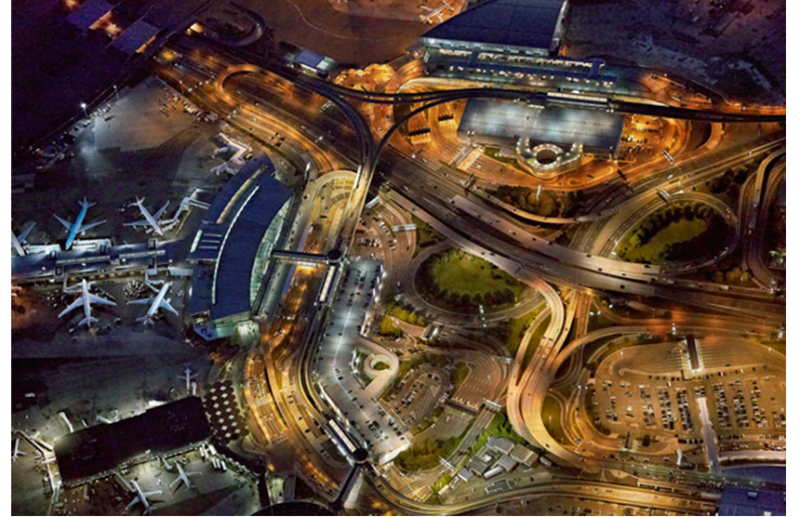Argentina –
When most people think of family vacations with children, they picture Disneyland or a theme park. But Dylan Drake and Tomas Cortijo found a whole new way to create a family bond. In 2013 the family took a road trip from Argentina to Montana with nothing but a Ford Ranger and camper trailer. After accomplishing this feat, they are now attempting to break a world record by riding 6,000 miles on an electric bicycle. Emaho caught up with the ‘Camper Clan‘ family that is accomplishing what many people wouldn’t even do alone.
Emaho: I see that Dylan is from the US and Tomas is from Argentina. You also described this trip as “bridging our two worlds and hopefully bringing them closer together”. In what ways did the trip bring the two worlds closer?
CC: When you are a multi-cultural family, there are many obstacles that must be overcome in order to find a peaceful balance between two cultures and languages. The most obvious is the distance your family must travel in order to visit both sides of your family, or deciding which country to live in. But there are more subtle obstacles that reveal themselves over time, such as how to approach raising children or how to find a balance between work and family that is in line with each person’s values. As in any marriage, there are ups and downs. At times, it felt like we were so focused on our differences that we were in danger of forgetting that we had many, many things in common, one of them being our love of travel. As we explore the world together, both of us are expats at the same time and both of us are fully engaged in each day as we learn and explore new places. As we meet people and come to understand cultures that are very different from both Argentine and American cultures, we are reminded that we are all human, we are all citizens of the world, and the barriers we thought were so important mean very little. So in this way, our two worlds can begin to merge into one, and that is our shared experience.
Emaho: You decided to head back to the USA after working in Argentina. But after “the seed of an idea had started to grow,” you ended up driving all the way back. What inspired you to do this?
CC: When we lived together in California, we went on a great many road trips. We drove from San Diego to the tip of Baja California, Mexico one summer. Another summer we rented a car and drove through Spain, France, and Italy. In Argentina we drove from Buenos Aires on the east coast to the Andes Mountains. We love the freedom of driving, and the ability to stop and explore and change your route. We love watching the landscape slowly change and finding unexpected adventures and friends along the way. So when we knew we were going to return to the USA but had nothing to go back to in terms of jobs, we felt that this was our chance to make the road trip of a lifetime. Neither one of us had ever been to many of the countries that we would pass through, and we were both excited to have a chance to visit such places as Machu Picchu, the Amazon Rainforest, and the Galapagos Islands. We knew that once we returned to the US and began working we would have very limited vacation time, and we wanted to enjoy our freedom while we had the chance—and do it as a family!
Emaho: In what ways have these journeys impacted your children’s lives?
CC: Our children, like all children, are incredibly adaptable. Before we left on our trip across the Americas, I remember being very worried about how the children would sleep in their new arrangements. I was concerned that my son, who was only a year and a half old at the time, would keep my daughter awake. But we found that after a week or so they both adjusted quite well and fell asleep without any problem at bedtime. So they have both learned to be flexible and at this point we can take them anywhere and they are happy to be exploring along with us. We spend a great deal of time talking about the different places we go, and what is unique to each place. We talk about the animals, the features of the landscape, and the customs of the people. They are both bilingual and understand that there are many languages spoken in the world. Though they are very young and may not consciously remember details of our journeys, we know that their minds have been expanded from the start.
Emaho: Many people travel and pursue expeditions alone, but you have a whole family. What are some of the difficulties in travelling with a family as opposed to travelling alone?
CC: Having traveled as single adults, as a couple, and now as a family, we have learned that each way presents very different joys and challenges. As a person traveling alone, you may worry about safety but enjoy the freedom. When you travel as a couple or with friends, you must negotiate and compromise along the way, but you benefit from camaraderie. When you travel with kids, you travel slow—children simply cannot keep up a rigorous travel schedule. You have to find fresh food, safe lodging, and make time for play and naps. You can try to pack light, but there are corners you can’t cut with kids, such as making sure you bring along medicine or extra warm clothes—just in case. But the joys in traveling with a family are that no matter where you go, the children will connect with others. They literally break down walls with their charming smiles. We always find a playground and it’s amazing to see our little ones make instant friends with other children—even if they don’t speak the same language. People you meet let down their guard when they see a family, and are more likely to speak to you or help you. So we try not to see traveling with children as a difficulty, but rather as a gift.
Emaho: At a military checkpoint the men opened the door and began interacting with your children. Were you nervous? Have there been any times when you felt your children were in danger?
CC: We were not nervous about the army in Colombia—in fact, the police and military in Colombia were some of the most trustworthy of any we met through our travels. We never once were asked for a bribe or were made to feel uncomfortable by the authorities in Colombia. We’re not sure why—perhaps because they truly are risking their lives in the regions they police as armed rebel groups are constantly vying for control there. But we never felt that our children were in danger once on our trip. We always traveled carefully, drove only during the day, and always asked locals about the routes we wanted to take to make sure they were safe.
Emaho: Funding your travels comes from working online from the road, Kickstarter, and careful saving. Is it difficult to provide for a family of four while on the road? What are some of the best ways that you’ve found to save money?
CC: This is one of the things that people wonder about most. Some assume we are wealthy or are living off family money, which is not true at all. When my husband and I were first married we drove a $350 car and lived in one of the ugliest parts of town to save money. We started out in menial jobs and worked our way up, working hard and studying. We have always been very careful with money, and have made it a point to live very frugally even when our incomes were relatively high later on. Even as our friends bought beautiful homes filled with gorgeous furniture, we continued to rent and sit on hand-me-down sofas for years. So we made our sacrifices so that we could do what we wanted to do later on. I think they best advice for saving money is to think about what you are buying—do you really need it? Is there a more inexpensive option?
Emaho: Your blog says that your friend Lorraine Chittock inspired you to travel more like explorers than tourists. How did this mindset change your trip?
CC: Meeting Lorraine, a seasoned and inspiring traveler, was a big turning point in how we were approaching our travels. My family and I were just beginning our trip from Buenos Aires to the United States, and we were rushing from one destination to the next. When Lorraine found out how quickly we were passing through Chile, she was surprised and urged us to slow down. So we did! From that point we would stay one to three weeks in a place, which was wonderful for the children as they could relax and play and make friends. Instead of heading for the tourist spots, we sought out places that were more off the beaten path. For example, we decided to detour off the Panamerican Highway to visit a friend in Paraguay. Most adventurers skip this landlocked country altogether as there isn’t much to “do” there, nor much impressive scenery or trekking. But the three weeks we spent in Paraguay were some of the most life-changing of our trip. We stayed with a family that welcomed us with open arms and taught us how wonderful it is to simply just spend time together as a family. They showed us how living a simple life in the countryside can be a much richer life than any other.
Emaho: When crossing the border into Costa Rica, you were told that everyone but Tomas could bypass the line. Tomas was eventually allowed to stay with you though. Were there any times during the journey when you had to split up?
CC: Crossing into Costa Rica from Panama was extremely frustrating—it was actually the border crossing where the officials treated us the most rudely. As always when crossing a border there are many forms and lots of paperwork to fill out, and the people there did not want to let us use a pen even though it was right on the desk—so I had to go back out to our truck with my toddler in my arms to find one. We saw them turn a single mother with a baby and a toddler away just because she was not respectful to them. In Latin America (not so in the US), families with young children are given priority to pass through lines in many cases. So we were very surprised when they told us that only one parent and the child could pass through. This was very illogical to us, as we would only end up having to wait for him anyway. I was very thankful for my husband at that moment, and for his negotiating ability! He convinced them to let us all pass together, which was such a relief as the children get very anxious in situations such as border crossings. Luckily we never had to split up!
Emaho: Right now you’re attempting to break a world record by riding 6,000 miles on an electric bicycle! Your Kickstarter page mentions that you’re doing this to “promote sustainable transportation” and “promote a healthier lifestyle for Americans.” Why did you choose to promote these particular issues? Do you think your journey so far has done much to promote them?
CC: After living abroad and traveling extensively, then returning to the US, we were shocked to see the state of people’s health here. The American lifestyle—eating processed foods, spending hours a day in the car with little exercise—is not one that leads to health and happiness. But it’s very difficult to change because our cities are designed for cars. Due to zoning we must live very far from where we work, so most people can’t walk to work or to the store. We have to try to fit exercise in to an already busy day, and most people just can’t seem to do it.
That’s where electric bicycles can help. The extra push you get from the motor gives you the power to reach speeds only professional cyclists can, so you can cover more ground between home and work while getting a gentle workout. We love that we can ride with our kids or go on the grocery run, all while having fun and using a mode of transportation that doesn’t pollute. And best of all, the money you save by forgoing the use of your car as much as possible can make a big impact on your wallet.
We feel so strongly that electric bicycles can make a positive impact on the planet and in our everyday lives that we wanted to do something to get the word out. As part of our World Record attempt, we must find witnesses in each place that we stop that can sign a book to prove we were there. Many people we meet have never heard of electric bicycles, so we enjoy letting them take one for a ride and see for themselves how fun they are. We hope we can inspire everyone to try to find ways every week to get out of their car. As they head out the door, if they could just stop a moment and think: do I need to drive there? Or can I walk, bike, or e-bike? Every choice counts and makes a difference—not just for each person, but for the whole planet.
Art & Culture Interviewed by Connie Lee
